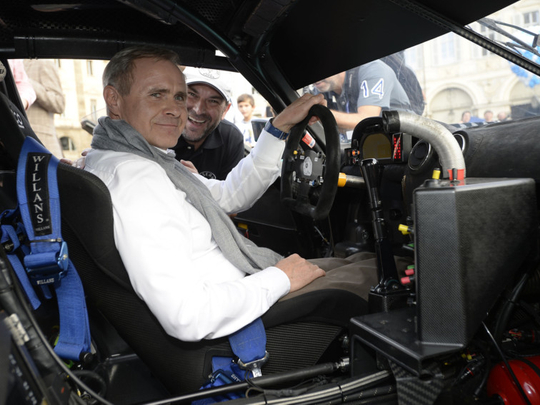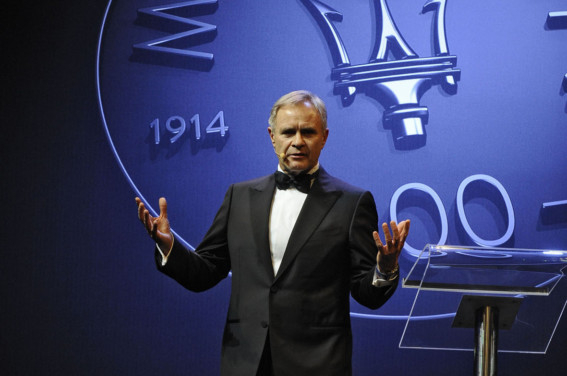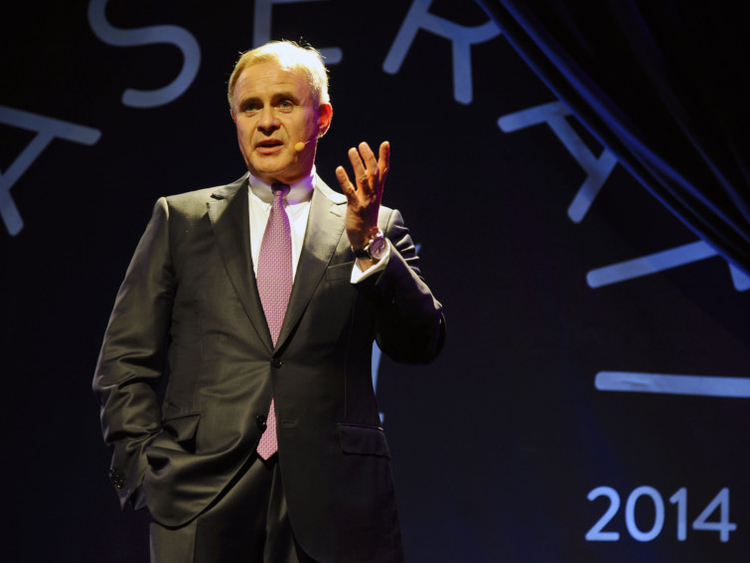
Dubai: Levante, Maserati’s first sport utility vehicle (SUV), which could arrive in the Gulf by the second quarter of next year, will push forward the company’s future sales, according to the company’s CEO.
Harald Wester, who spoke to journalists from Dubai following Emirates’ first flight to Bologna earlier in November, said the company has plans to increase its sales to different parts of the world, including the Middle East.
“We are going to launch the SUV, Levante, in the beginning of next year. Production will start in February, and it will hit the markets starting in Europe,” Wester said in his office in Modena, the motor city of Italy and home to many automotive plants, including one for Ferrari.
The 2016 Levante is scheduled to be launched at the Geneva Motor show in March 2016. It is expected to reach Gulf markets by the second quarter of next year, said Maserati officials in Dubai. Wester explained that the production of an SUV by a company known for producing sporty and luxury cars will meet peoples’ demands.
“We have to offer what people want to buy,” he said when asked by Gulf News if he expects the new production to be as popular as the previous models.
The car market have seen major changes in the past years, Wester said. The size of the global luxury car market, where the average price of each vehicle is around €70,000 (Dh274,000), is nearly one million units annually, while the overall size of the global, annual car market is around 85 million.
Rapid growth
In the past, the car market worldwide was dominated by sedans. However, today the SUV have “grown enormously,” he added.
At the same time, “the luxury car market ... [According to] our expectations when we close the year, it will be down by 15 per cent,” Wester said.
Last year, Maserati’s wholesales were nearly 36,500 vehicles, with total revenues of €2.7 billion (Dh10.5 billion). The company’s profit was €275 million last year (Dh1.07 billion).
However, with the launching of the new Levante, Maserati expects to increase its sales.
“I expect the new Maserati, the Levante, to become a car that is highly appreciated in the region, and I expect our company to grow significantly, once we launch this car,” Wester said.
By introducing the new Levante, Maserati would have lready walked “50 per cent down the road” of achieving its plans for the 2014-2018 period, in which the company hopes to reach a sales level of 75,000 cars per year.
Already, the two models that were launched in the previous few years, Quattroporte and Ghibli, “were successfully launched in the market and they are doing well,” said Wester.
Meanwhile, Maserati’s sales in the Middle East have grown considerably in the past four years, he said.
“It has grown up pretty much, I think we were in the range of 450 (for the entire Middle East countries) … in 2012. It has grown ... close to 4 times over the last few years. Last year, we ended up in the range of 1,500,” said Wester.
“I think the numbers this year will be slightly higher, and we believe that there is space to further grow next year with the availability of Levante,” he added.
Hybrid
Maserati may also be looking at introducing electric cars, which are in growing demand in the UAE.
“We are working on hybrid cars,” he said, adding that an electric Maserati “is not a bad idea”.
However, he added that making a “real electric car, doesn’t mean compromising the product,” or just changing one piece.
“I believe doing a real electric car, you really need to redefine everything …. and that will require a significant investment, because you would need to start with a white sheet of paper.”
“A designed electric Maserati is an interesting project but it would require a significant amount of development, and it requires a certain adaptation of our industrial backbones; factories, which are producing our cars currently. [Factories] wouldn’t be able to do something like this, and it [to produce electric cars] will require a lot of money, which you need to have before you spend.”
Demographics
The “typical” character of a Maserati owner differs from one region to another, according to Harald Wester, Maserati’s CEO.
In the US, one of the biggest markets for the luxury cars, and the rest of the western mature markets, “our typical customers are predominantly male, wealthy, 55 [years old] and above,” said Wester.
In the Middle East, and the Gulf region in particular, the customers are “male, but significantly younger. In China, which is a customer market in many ways, we have female customers, up to 40 per cent and they are very young. I think the average age is below 40.”
Explaining the high percentage of Chinese women driving Maserati, officials said this is due to several factors, including the high percentage of female entrepreneurs and the fact that the Chinese are using the brand and luxury products to boost their image and reflect their financial status.














